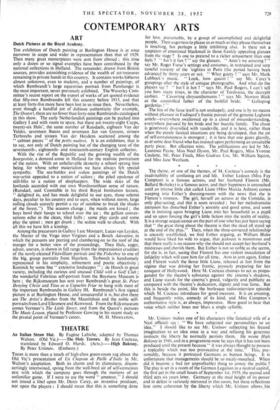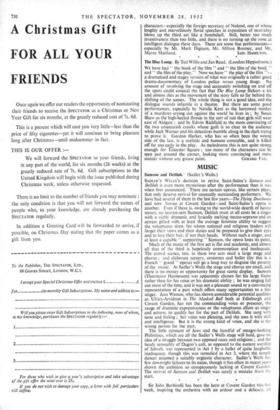THEATRE
THERE is more than a touch of high-class green-room rag about the Old Vic's presentation of Un Chapeau de Faille d'Italie in Mr. Walton's adaptation. Both its charm and its clumsiness, discon- certingly intertwined, spring from the well-bred air of self-conscious zest with which the company goes through the motions of an unfamiliar game. If I were to use the word "amateur," I should not intend a libel upon Mr. Denis Carey, an inventive producer, nor upon the players : I should mean that this is something done for love, presumably, by a group of accomplished and delightful people. Their eagerness to please us as much as they please themselves is touching, but perhaps a little inhibiting also. Is there not a suspicion of emotional blackmail in those frankly appealing glances from the stage ? Is one to pretend to a richer amusement than one feels ? "Isn't it fun ? "say the glances. " Aren't we amusing ? " say Mr. Roger Furse's settings and costumes, in restrained and very tasteful travesty of the 'eighties in Paris (the period having been advanced by thirty years or so). "What gaiety ! "says Mr. Mark Lubbock's music. "Look, how quaint " say Mr. Carey's groupings after the style of antique photographs. And what do the players say ? " isn't it hot ? " says Mr. Paul Rogers, I can't tell you how many times, in the character of Tardiveau, the decrepit cashier. "Cavorting chrysanthemums ! " says Mr. Newton Blick as the countrified father of the bashful bride. "Galloping gardenias ! "
The line of the farce itself is not unshapely, and one is by no means without pleasure in Fadinard's frantic pursuit of the genuine Leghorn article—everywhere swallowed up in a cloud of misunderstanding, everywhere pursued by his bride and her bucolic family. The chase is generously diversified with vaudeville, and it is here, rather than when the purely farcical situations are being developed, that the air of self-consciousness is strongest ; it is here that one gazes glassily, as at some dear friend who has insisted upon performing an unsuitable party piece. But affection wins. The jollifications are led by Mr. Laurence Payne, Miss Noel Dyson, Mr. Paul Rogers, Miss Yvonne Coulette, Mr. Peter Finch, Miss Gudrun Ure, Mr. William Squire, and Miss Jane Wenham.
The theme, or one of the themes, of M. Cocteau 's comedy is the inadvisability of confusing art and life. Esther Ledoux (Miss Fay Compton) is a famous actress, and her husband Florent (Mr. Ballard Berkeley) is a famous actor, and their happiness is untouched until an intense little chit called Liane (Miss Marcia Ashton) comes weeping into Esther's dressing-room with the news that she is Florent 's mistress. The girl, herself an actress at the Comedic, is only play-acting, and this is soon revealed ; but her melodramatic intrusion has disturbed Esther's serenity and good sense, and soon she is insisting upon bringing Liane into her household as a pupil and so upon forcing the girl's little fiction into the realm of reality. It is a strange acquiescence on the part of one who has just been saying that" the great thing about the theatre is that the dead all stand up at the end of the play." Then, when the three-cornered relationship is uneasily established, we find Esther arguing, as William Blake would have liked his wife to argue, that jealousy is monstrous and that there really is no reason why she should not accept her husband's mistresses and cherish them. But Esther is not so noble as she seems, for she is, in fact, seeing that Florent has one violent inoculation of infidelity which will cure him for all time. Arm in arm again, Esther and Florent watch the fierce little Liane, released at last from the regime that was driving her frantic, joyously preparing for her conquest of Hollywood. Here M. Cocteau chooses to act as propa- gandist for the theatre's substance against the cinema's shadows, and Liane stands for the cinema's greed, vulgarity and publicity as compared with the theatre's dedication, dignity and true fame. But this is beside the point, like the burlesque radio-interview episode which M. Cocteau introduces for good measure. It is an amusing, and frequently witty, comedy of its kind, and Miss Compton's authoritative style is, as always, impressive. How good to hear that voice which neither loses nor blurs a single syllable.
•
Mr. Ustinov makes one of his characters (the fanatical wife of a Nazi official) say : "We have subjected our personalities to an idea." I should like to see Mr. Ustinov subjecting his fecund imagination to an idea once in a way and refusing his generous instincts the liberty he normally permits them. He wrote High Balcony in 1946, and in a programme-note he says that it has not been produced until the present because" it was always ffiought to possess a topicality which was too provocative at the time." This, pre- sumably, because it portrayed Germans as human beings. It is unfortunate that managements should be so mealy-mouthed. When did it become a bad (or unprofitable) thing to annoy the public ? The play is set in a room of the German Legation in a neutral capital, the first act in the small hours of September 1st, 1939, the second and third acts six years later. Germany at the mad height of its power and in defeat is variously mirrored in this room, but these reflections lose some coherence by the liberty which Mr. Ustinov allows,his characters—especially the foreign secretary of Noland, one of whose lengthy and marvellously florid speeches in exposition of neutrality blows up the third act like a bombshell. Still, better too much inventiveness than too little, and there is no turning up the nose at intelligent dialogue these days. There are some fine performances— especially by Mr. Mark Dignam, Mr. Milton Rosmer, and Mr.



































 Previous page
Previous page